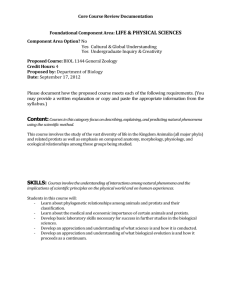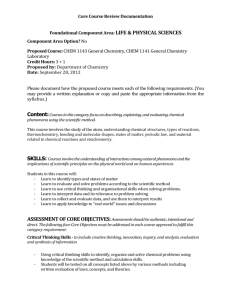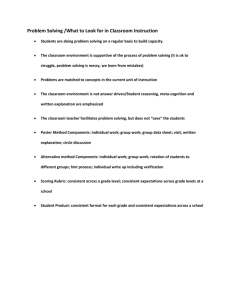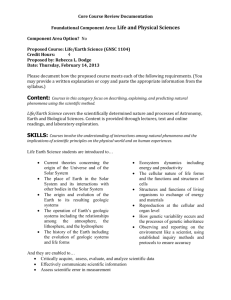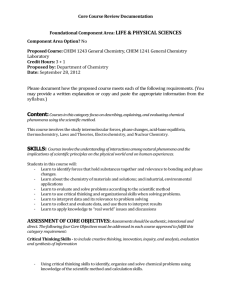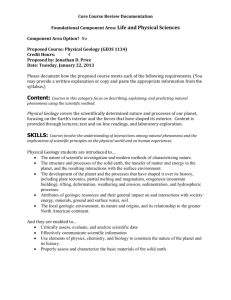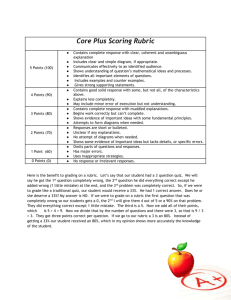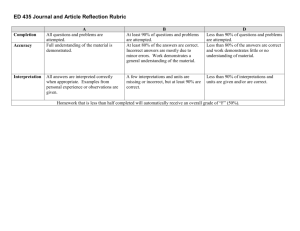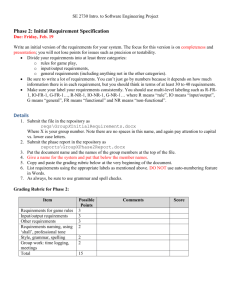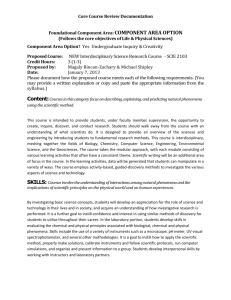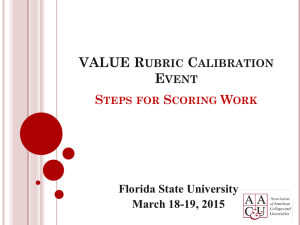method biological
advertisement
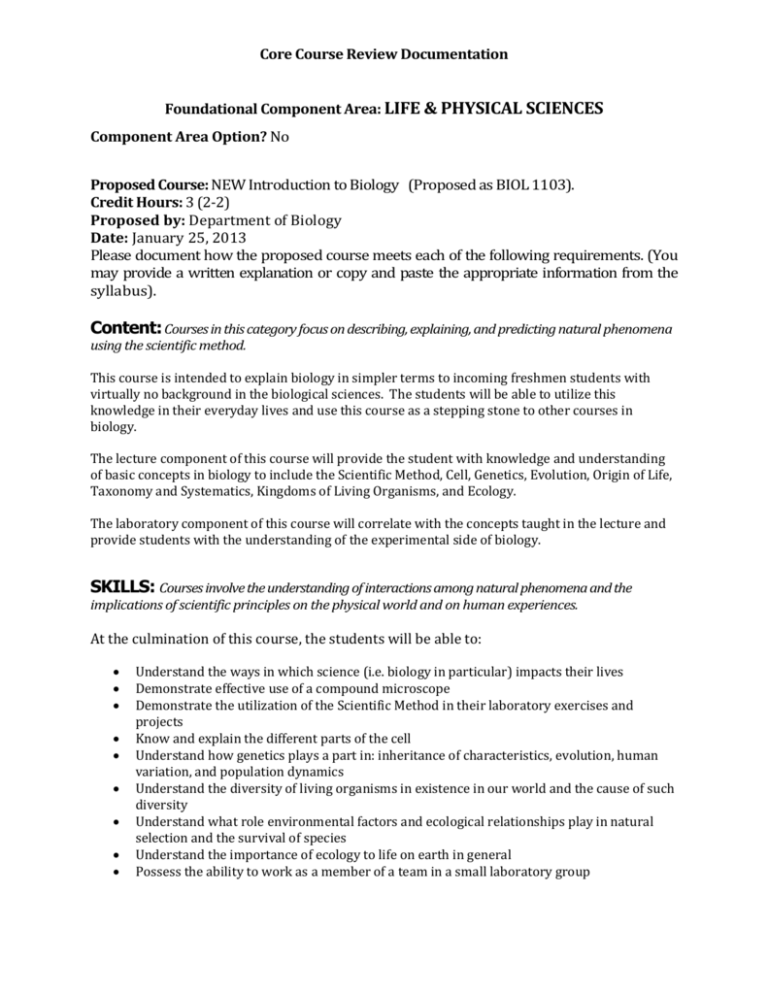
Core Course Review Documentation Foundational Component Area: LIFE & PHYSICAL SCIENCES Component Area Option? No Proposed Course: NEW Introduction to Biology (Proposed as BIOL 1103). Credit Hours: 3 (2-2) Proposed by: Department of Biology Date: January 25, 2013 Please document how the proposed course meets each of the following requirements. (You may provide a written explanation or copy and paste the appropriate information from the syllabus). Content: Courses in this category focus on describing, explaining, and predicting natural phenomena using the scientific method. This course is intended to explain biology in simpler terms to incoming freshmen students with virtually no background in the biological sciences. The students will be able to utilize this knowledge in their everyday lives and use this course as a stepping stone to other courses in biology. The lecture component of this course will provide the student with knowledge and understanding of basic concepts in biology to include the Scientific Method, Cell, Genetics, Evolution, Origin of Life, Taxonomy and Systematics, Kingdoms of Living Organisms, and Ecology. The laboratory component of this course will correlate with the concepts taught in the lecture and provide students with the understanding of the experimental side of biology. SKILLS: Courses involve the understanding of interactions among natural phenomena and the implications of scientific principles on the physical world and on human experiences. At the culmination of this course, the students will be able to: Understand the ways in which science (i.e. biology in particular) impacts their lives Demonstrate effective use of a compound microscope Demonstrate the utilization of the Scientific Method in their laboratory exercises and projects Know and explain the different parts of the cell Understand how genetics plays a part in: inheritance of characteristics, evolution, human variation, and population dynamics Understand the diversity of living organisms in existence in our world and the cause of such diversity Understand what role environmental factors and ecological relationships play in natural selection and the survival of species Understand the importance of ecology to life on earth in general Possess the ability to work as a member of a team in a small laboratory group Core Course Review Documentation ASSESSMENT OF CORE OBJECTIVES: Assessments should be authentic, intentional and direct. The following four Core Objectives must be addressed in each course approved to fulfill this category requirement: Critical Thinking Skills - to include creative thinking, innovation, inquiry, and analysis, evaluation and synthesis of information - Using the exercise for performing quantitative skills (attachment: Metric Measurement and the Scientific Method) taken from the lab manual used for this course, the scientific method will be incorporated in which the students make observations, construct hypotheses, make precise measurements, test hypotheses, and evaluate data they collected. This will be assessed based on the grading of the exercises. Student introduction to using the scientific method and applying it to a simplistic situation as presented in the exercise should inherently help students in the development of critical thinking skills that are intrinsic to science. - This exercise includes identifying a problem, gathering data/evidence, developing their own hypothesis, testing their hypothesis, and forming conclusions based on the data and outcome of their testing. The exercise will be used to determine if a student has exceeded the “benchmark” status of critical thinking as set by the AACU in their Critical Thinking VALUE rubric (attached). This is the level of expectation of achievement in the sciences for a freshman core class concerning this learning objective. Four rows of the Critical Thinking Rubric will be used: Explanation of Issues, Evidence, Student’s Position, and Conclusions and Related Outcomes. Communication Skills - to include effective development, interpretation and expression of ideas through written, oral, and visual communication - Students will conduct poster presentations about a case study of interest. The student’s grade will be determined using a standardized rubric for assembling and presenting the poster (attachments: Introduction to Biology Poster Instructions and Introduction to Biology Poster Presentation Rubric), but the core assessment will be from the AACU rubrics mentioned below. - This activity includes numerous aspects of the core objective such as organization, use of sources as support, use of proper scientific language, informative writing, etc., and will be used to determine if a student has exceeded the “benchmark” status of written and oral communication as set by the AACU in their Written Communication and Oral Communication VALUE rubrics (attached). This is the level of expectation of achievement in the sciences for a freshman core class concerning these learning objectives. Three rows of the Oral Communication Rubric will be used: Organization, Language and Supporting Material. Three rows of the Written Communication Rubric will be used: Content Development, Sources and Evidence, and Control of Syntax and Mechanics. Core Course Review Documentation Empirical and Quantitative Skills - to include the manipulation and analysis of numerical data or observable facts resulting in informed conclusions - As previously mentioned under the Critical Thinking Core Objective, students will perform an exercise from the lab manual that involves metric conversions, measurements and calculations of quantitative data while incorporating the scientific method (attachment: Metric Measurement and the Scientific Method). Grading of the exercise will be used for this assessment. - This activity includes the ability to interpret numerical data, properly calculate, convert, represent, and communicate numerical data through tables and graphs, as well as use numerical data to make and support a point. This exercise will be used to determine if a student has demonstrated at least the “benchmark” status of empirical and quantitative skills as set by the AACU in their Quantitative Literacy VALUE rubric (attached). This is the level of expectation of achievement for a freshman core class concerning this learning objective. Five rows of the Quantitative Literacy Rubric will used: Interpretation, Representation, Calculation, Application/Analysis, and Communication. Teamwork - to include the ability to consider different points of view and to work effectively with others to support a shared purpose or goal - Individual student evaluation of the teamwork objective will become a component of the student’s grade for laboratory (10% of their lab grade for the course). Students will each evaluate their perceived percentage contribution to the poster by each student in their group as well as themselves. This will incorporate a “self-assessment” component of teamwork (attachment: Student Evaluation of Contribution to Poster Presentation). This individual assessment for teamwork will be incorporated into the grading rubric for poster presentations (attachment: Introduction to Biology Poster Presentation Rubric). This grading rubric will be used for grading purposes, but the core assessment will be performed as described below. - The specific assessment for teamwork will be the student’s work in groups to construct and present posters, as previously mentioned under the Communication Core Objective. This includes sharing ideas, exhibiting collegiality, and showing responsibility in completing a task by deadline within a group. Students will be grouped by random selection to develop fair, unbiased groupings of students. This activity will be used to determine if a student has demonstrated at least the “benchmark” status of teamwork as set by the AACU in their Teamwork VALUE rubric Core Course Review Documentation (attached). This is the level of expectation of achievement for a freshman core class concerning this learning objective. Three rows of the Teamwork Rubric will used: Contributes to Team Meetings, Facilitates the Contributions of Team Members, and Fosters Constructive Team Climate. - ADDITIONAL INFORMATION: Provide any additional information supporting course inclusion in the core (optional). PLEASE ATTACH THE FOLLOWING 1. 2. 3. 4. 5. Syllabus Assessment for Critical Thinking Skills Assessment for Communication Skills Assessment for Empirical & Quantitative Skills Assessment for Teamwork
